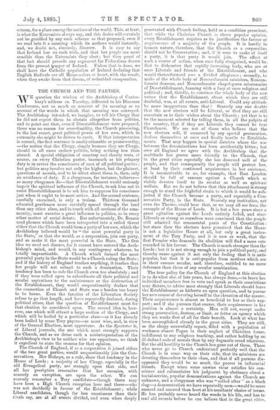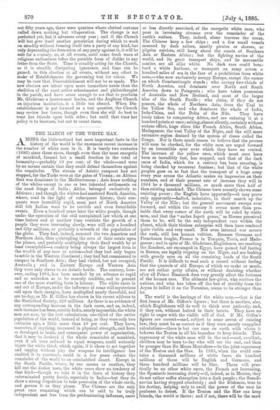THE CHURCH AND THE PARTIES.
WE question the wisdom of the Archbishop of Canter- bury's address on Tuesday, delivered to his Diocesan Conference, not so much on account of its meaning as on account of the words in which that meaning was conveyed. The Archbishop intended, we imagine, to tell his Clergy that he did not expect them to abstain altogether from politics, and to point out that, even if Disestablishment were proposed, there was no reason for over-timidity, the Church possessing, in the last resort, great political power of her own, which in extremity she might be driven to exert. If that interpretation is correct, the first sentence is unobjectionable or praiseworthy, —the notion that the Clergy, simply because they are Clergy, should in all cases eschew politics, being nothing less than absurd. A special obligation of courtesy and charity rests, of course, on every Christian pastor, inasmuch as his primary duty is to revive the consciences of men of all political parties ; but politics may involve not only the highest, but the plainest, questions of morals, and to be silent about them is, then, only an avoidance of duty. If a clergyman, for instance, believes— as many clergymen do—that Disestablishment would seriously impair the spiritual influence of the Church, to ask him not to resist Disestablishment is to ask him to suppress his conscience just when it ought to be most active. And the second sentence, carefully examined, is only a truism. Thirteen thousand educated gentlemen more carefully spread through the land than any other class, and in touch with all sections of the com- munity, must exercise a great influence in politics, as in every other matter of social debate. But unfortunately, Dr. Benson used phrases which have been interpreted into a veiled threat either that the Church would form a party of her own, which the Archbishop believed would be " the most powerful party in the State," or that she would, as a corporation, join one party, and so make it the most powerful in the State. The first idea we need not discuss, for it cannot have entered the Arch- bishop's mind, and would, in any contingency whatever, be totally impracticable. A Church which formed the most powerful party in the State would be a Church ruling the State ; and if the history of England teaches anything, it teaches that her people will not submit to such a domination. Their tendency has been to rule the Church even too absolutely ; and if they were called upon to subordinate all their political and secular aspirations to the maintenance or the destruction of the Establishment, they would unquestionably declare that the connection of Church and State was a burden too heavy to be borne. Even the fanatics of the Liberation Society refuse to go that length, and have repeatedly declared, during political crises, that the question of Establishment must for that election be considered open. The second idea is, how- ever, one which will attract a large section of the Clergy, and which will be hailed by a particular class—as it has already been hailed by some Tory papers—as most wise, and, in view of the General Election, most opportune. As the Spectator is, of Liberal journals, the one which most strongly supports the Church, and as we deem such a misinterpretation of the Archbishop's view to be neither wise nor opportune, we think it expedient to state the reasons for that opinion.
The Church of England, if as a corporation it joined either of the two great parties, would unquestionably join the Con- servatives. Her Bishops, as a rule, show that tendency in the House of Lords ; a majority of her Clergy, especially in the old Evangelical party, are strongly upon that side, and all her presbyters remember that her enemies, with scarcely an exception, are upon the other. We can scarcely remember a Tory candidate—though there may have been a High Church exception here and there—who was not decidedly in favour of the Establishment ; while Liberal candidates, though far less unanimous than their rivals say, are at all events divided, and even when deeply penetrated with Church feeling, hold as a condition precedent, that while the Christian Church is above popular opinion, every Establishment requires as its justification the favour or acquiescence of a majority of the people. It is hardly in human nature, therefore, that the Church as a corporation should not be Conservative ; and, if it were to make of itself a party, it is that party it would join. The effect of such a course of action, when once fully recognised, would be, first to dishearten that rapidly increasing body, who are at once Liberals and friends of the Establishment, and who would thenceforward owe a divided allegiance ; secondly, to make of the whole body of Nonconformist ministers, Noncon- formist deacons, and Nonconformist chapel-goers missionaries of Disestablishment, foaming with a fury at once religious and political ; and, thirdly, to convince the whole body of the new voters that the Establishment, about which they are still doubtful, was, at all events, anti-Liberal. Could any attitude be more inopportune than that ? Scarcely any one doubts that the new electors will be Liberal, or that they are still uncertain as to their wishes about the Church ; yet that is to be the moment selected for telling them, in all the pulpits of the country, that if they are Liberals they cannot be true Churchmen. We are not of those who believe that the new electors will, if unmoved by any special provocation, declare themselves at once and finally hostile to Establish- ments. That may happen in special districts where the war between the denominations has been accidentally bitter ; but over all England we agree with the Archbishop that the multitude has grown more friendly to the Church, that in the great cities especially she has deserved well of the people, and that consequently the people will protect her, at least by their continued acquiescence in her existence. It is inconceivable to us, for example, that East London should be full of rancour against a Church which so visibly devotes itself to its secular as well as spiritual welfare. Bat we do not believe that this attachment is strong enough to stand the frightful strain to which it would be sub- jected if the Church became a party, and especially a Con- servative Party, in the State. Scarcely any institution, not even the Throne, could bear that, as we may all see from the example of the House of Lords. It is but a few years since a great agitation against the Lords entirely failed, and since Liberals as strong as ourselves were convinced that the people still admired the ornamental parts of the Constitution ; but since then the electors have perceived that the House is not a legislative House at all, but only a great instru- ment of the Tory Party, and it is now so weak, that the first Premier who demands its abolition will find a mass vote recorded in his favour. The Church is much stronger than the Lords ; but it is not strong enough to join a political party, and thereby rouse against it not only the feeling that it is anti- popular, but that it is anti-popular from motives which are in their essence secular, and, therefore, entitled to no more- deference than those of any secular combination.
The true policy for the Church of England at this election is to do what she, of late years, has always done,—to leave her individual members free to vote and speak as their convictions may dictate, to advise most strongly that Liberals should leave the Establishment as hitherto an open question, and to pursue her new course of devoting herself to the elevation of the masses. Their acquiescence is almost as beneficial to her as their sup- port ; and if she pursues that course, their acquiescence in her position is almost a certainty. Men will not, except under strong provocation, destroy, or limit, or fetter an agency which they see works first of all for their benefit. Look at what has been accomplished already in the great cities. They are still, as the clergy sorrowfully report, filled with a population of workmen almost Pagan in their neglect of Christian forms. indifferent to any religious teaching, and rather holding by an ill-defined code of morals than by any dogmatic creed whatever. But the old hostility to the Church has gone out of them. Those who never go to Church understand perfectly well that the Church is in some way on their side, that its ministers are devoting themselves to their class, and that if all parsons dis- appeared they would he so much the poorer in influential friends. Except when some unwise vicar satisfies his con- science and calumniates his judgment by obstinacy about a burial-service, popular demonstrations against the Church are unknown, and a clergyman who was " called after " as a black slug—a demonstration we have repeatedly seen—would be more amazed and amused than hurt at his assailants' choice of terms. He has probably never heard the words in his life, and has to read old records before he can believe that in the great cities,
not fifty years ago, there were quarters where clerical costume called down nothing but vituperation. The change is not perfected yet, but it advances every year ; and if the Church will but give itself another generation during which to work on. steadily without forming itself into a party of any kind, but only deprecating the formation of any party against it, it will be safe for a century, or, at all events, until some fresh wave of religious enthusiasm takes the possible form of dislike to any fetter from the State. Time is steadily acting for the Church, as it is steadily dissipating ignorance, and time can be gained, in this election at all events, without any effort to make of Establishment the governing test for voters. We may be sure that Disestablishment will not be so made. The new electors are intent upon more immediate needs than the abolition of the most active schoolmaster and philanthropist in the parish, and have sense enough to see that to proclaim Mr. Gladstone a heaven-sent leader, and the Anglican Church an injurious institution, is a little too absurd. When Dis- establishment is put forward as a test question, the Church may review her forces, though even then she will do best to trust her friends upon both sides ; but until that time her policy is to increase, but not to count them.



































 Previous page
Previous page